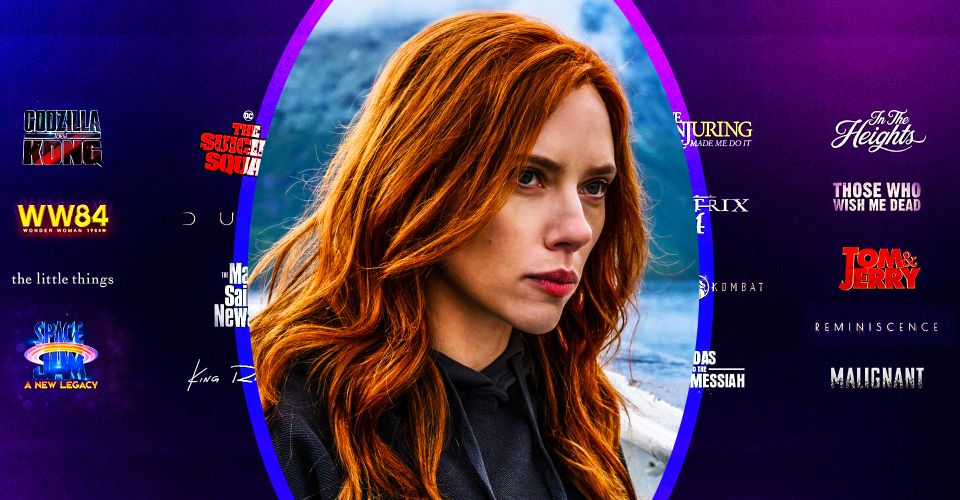Disney’s Lawsuit Proves WB Handled HBO Max Theatrical Releases Right

Scarlett Johansson is suing Disney over breach of contract due to the day and date streaming release of Black Widow, further proving Warner Bros. controversial handling of 2021 releases on HBO Max was the right decision. Much fuss was made over how the HBO Max decision would impact the theater industry, but directors like Christopher Nolan and Denis Villeneuve also called the studio out for their lack of consultation with talent, as word came out that many actors like Denzel Washington, Margot Robbie, and others were also upset as their compensation was tied to theatrical revenue.
The decision was so extreme and wide-reaching that WB was under a lot of fire, especially since there was no warning of any kind, but now that we’re more than halfway through 2021 and the post-pandemic box office is still struggling to recover, WB’s decision doesn’t seem nearly so controversial. The news of Scarlett Johansson suing Disney, and other actors considering their own suits, only makes the way WB navigated the whole affair months ago look less extreme.
The theatrical landscape is still changing, and uncertainty over the potential impact of the delta variant triggering another wave of lockdowns could certainly have a big impact, but the decisions being made about theatrical releases and streaming are only the beginning, and it’s looking more and more like WB’s biggest crime was just being the first one to pull the trigger.
WB’s 2021 HBO Max Streaming Decision Was Necessary

The first thing to note is the decision to release all of WB’s 2021 theatrical titles to HBO Max on streaming day and date was necessary. After months of lockdowns where most theaters couldn’t even release a movie if they wanted to, much less fill their seats, studios had billions of dollars wrapped up in movies, but no way to monetize them. Big movie studios may have enough cash to weather a bit of a storm, but simply delaying theatrical revenue for a year or more when expenses can’t be delayed in the same way wasn’t an option. The content was ready and people wanted to see it, they just needed to release it in a way that generated revenue, and people had to be able to safely access it. HBO Max was an obvious choice.
While WB’s sweeping announcement drew the most attention, they weren’t the only ones doing simultaneous releases. Many studios had newly-released movies streaming due to COVID-19, and Disney also released several of their movies to Disney Plus via their $30 Premier Access option. Disney Plus had already grown thanks to the success of big releases like The Mandalorian, and Disney Plus revenue quickly surpassed the average yearly theatrical revenue of most studios.
Warner Bros. Angered Talent, But (Mostly) Appeased Them

WB’s announcement was a shock and initially drew intense criticism. At first it seemed like the studio wouldn’t budge and was just going to stiff the creative talent involved in all the movies, but slowly and surely, news of new streaming deals for actors slowly trickled out. A number of actors saw contracts amended to include more guaranteed money and adjusted bonus thresholds to account for lower expected theatrical performance, and Denis Villeneuve even got Dune excluded from the day and date plan altogether (a move that’s likely to backfire, considering the combination of low post-pandemic box office, delta variant concerns, and his history with Blade Runner 2049‘s box office).
Despite the initial outcry over WB and Warner Media CEO Jason Kilar’s seemingly hard-line stance, the day and date decision turned out to be quite flexible, if not even more friendly (or at least more lucrative) for the talent involved. Of course, it was quite costly to WB, and much has been made of that expense, combined with the perceived box office opportunity cost, but it’s a hit Warner Media is surely taking in full knowledge of the long-term payoff that comes with faster HBO Max growth.
Not everything is sunshine and rainbows, though. While Warner Media seems to have repaired many of its key relationships, it may have still cost some, particularly Christopher Nolan, who was already dissatisfied with the studio’s handling of Tenet‘s release. Most recent headlines indicate he may be considering following his friend Zack Snyder to Netflix, which is a big move for him considering his well-known preference for the theatrical experience. Losing Christopher Nolan to Netflix would surely be a huge issue, but it’s hard to blame that solely on the HBO Max decision, considering his frustration with other decisions made by the studio on other issues over the past few years. Regardless, on the whole, WB’s decision to face their day and date mandate head-on ultimately avoided the kind of lawsuits Disney is now attracting.
Disney’s Handling of Streaming Releases Looks Suspicious in Hindsight

Instead of coming up with a blanket solution early on, Disney had delayed most of its big movies and was claiming a commitment to the theatrical experience, although Johansson’s lawsuit reveals she was suspicious of the Disney Plus release even before the pandemic hit. While big Disney releases like Cruella and Black Widow were on Disney Plus Premier Access, it wasn’t promoted in the same way as WB’s HBO Max decision, and Disney apparently made no effort to amend contracts or appease talent concerns. It’s not totally clear what outcome the studio expected, but it seems like they may have just been hoping nobody noticed, or that talent like Johansson didn’t have the nerve to actually file suit. Regardless of the reasons, not being up-front about the decision and tackling the contract amendments like Warner Bros. make it all look way more suspicious, particularly since most people’s attention wasn’t drawn to the behavior until Johansson filed suit.
Due to their failure to make a clear statement of their release intentions and renegotiating Johansson’s contract as Warner Media did with Gal Gadot and many others, Disney’s handling of their streaming releases ended up backfiring, landing them in even hotter water than Warner Media after the initial HBO Max announcement – especially given their hostile statement reacting to the suit. Now, other actors are following suit (literally) and even if Disney now does the hard work to sort out the related contracts, the legal costs and PR damage they face from their handling of the situation makes WB look far better by comparison.
About The Author


















